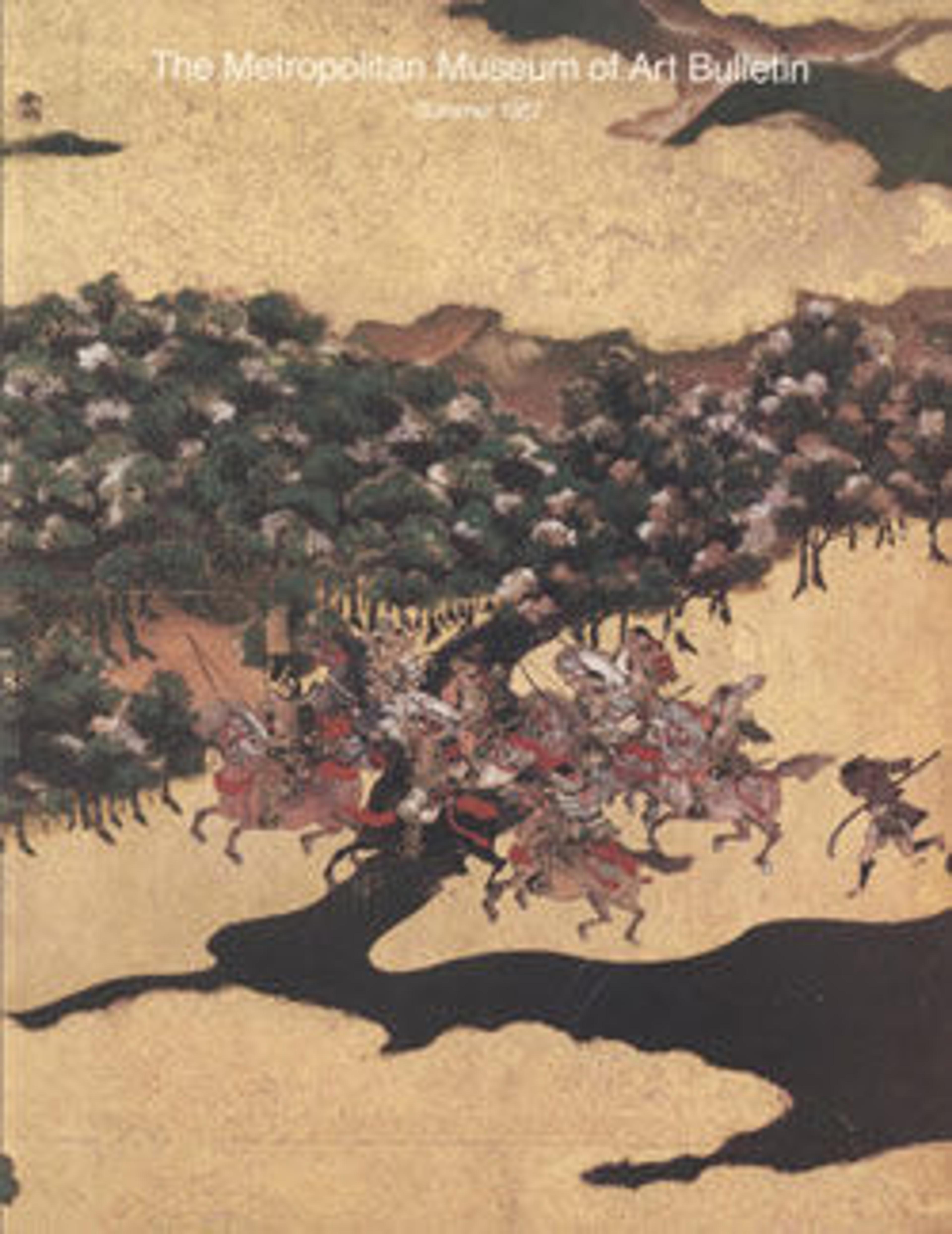Landscape after Li Bai's poem
Shifting time and distance are the subject of the well-known poem by the Tang poet Li Bo (701–762) that inspired and grace this landscape by Ike no Taiga:
Early morning, we leave Baidi, surrounded by tinted clouds.
Although Jiangling is a thousand li away, we arrive in a day.
Gibbons calling from riverside cliffs fail to detain us.
Our small boat has already passed ten thousand peaks.
Visually echoing the idiosyncrasies of the natural forms, Taiga's fluid and eccentric writing accentuates the outlines of the mountains and rocks and adds a literary dimension to an essentially decorative work. This pair of panels is an excellent example of his mature style, in which planes of mountain peaks are interspersed with the unpainted forms of clouds, river, and waterfalls. Taiga's characteristic drollery delights those who savor details, such as the tiny figures and playful gibbons, done, like the vines entwining the trees, with his fingernails instead of a brush.
Taiga signed his bold transcription of the poem as Sangaku (Three Peaks), a sobriquet he assumed in 1748, after a journey to the three famous mountains of Japan. This screen was originally a pair of sliding doors for a
residence in Niwase, near Izumo in western Japan.
Early morning, we leave Baidi, surrounded by tinted clouds.
Although Jiangling is a thousand li away, we arrive in a day.
Gibbons calling from riverside cliffs fail to detain us.
Our small boat has already passed ten thousand peaks.
Visually echoing the idiosyncrasies of the natural forms, Taiga's fluid and eccentric writing accentuates the outlines of the mountains and rocks and adds a literary dimension to an essentially decorative work. This pair of panels is an excellent example of his mature style, in which planes of mountain peaks are interspersed with the unpainted forms of clouds, river, and waterfalls. Taiga's characteristic drollery delights those who savor details, such as the tiny figures and playful gibbons, done, like the vines entwining the trees, with his fingernails instead of a brush.
Taiga signed his bold transcription of the poem as Sangaku (Three Peaks), a sobriquet he assumed in 1748, after a journey to the three famous mountains of Japan. This screen was originally a pair of sliding doors for a
residence in Niwase, near Izumo in western Japan.
Artwork Details
- Title: Landscape after Li Bai's poem
- Artist: After Ike no Taiga (Japanese, 1723–1776)
- Period: Edo period (1615–1868)
- Date: probably 19th century
- Culture: Japan
- Medium: Pair of two-panel screens, originally sliding-door panels; ink on paper
- Dimensions: 65 1/2 x 70 1/2 in. (166.4 x 179 cm)
- Classification: Paintings
- Credit Line: Purchase, The Charles Engelhard Foundation Gift, 1987
- Object Number: 1987.81a, b
- Curatorial Department: Asian Art
Audio
8925. Landscape after Li Bo's poem
0:00
0:00
We're sorry, the transcript for this audio track is not available at this time. Please email info@metmuseum.org to request a transcript for this track.
More Artwork
Research Resources
The Met provides unparalleled resources for research and welcomes an international community of students and scholars. The Met's Open Access API is where creators and researchers can connect to the The Met collection. Open Access data and public domain images are available for unrestricted commercial and noncommercial use without permission or fee.
To request images under copyright and other restrictions, please use this Image Request form.
Feedback
We continue to research and examine historical and cultural context for objects in The Met collection. If you have comments or questions about this object record, please contact us using the form below. The Museum looks forward to receiving your comments.
